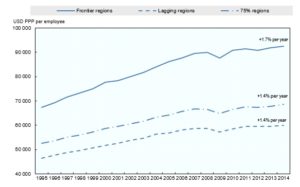New Ideas for Post-2020 Cohesion Policy: Structural Transformation and Inclusive Growth
As the debate on the direction of the EU and the post-2020 Multiannual Financial Framework intensifies, there are important questions about how the EU can best deploy its budgetary resources to meet the challenges facing the Union. The current precarious state of European integration and its uncertain future are clearly set out in the White Paper on the Future of Europe. The continuing effects of the financial, economic and migration crises are associated with reduced confidence and trust in democratic institutions and politicians, and a rise in populism, threatening the unity of the EU.
A major cause is the unequal impact of globalisation and technological change on different parts of the EU. A new paper prepared for the 7th Cohesion Forum argues that the EU not only needs to accelerate sustainable growth but also to resume convergence so that all parts of the EU are able to exploit the opportunities from the globalisation of trade and technological change.
The current economic situation in the EU is characterised by persistently low labour productivity growth at below one percent per year. Research suggests that the main source of the productivity slowdown is not a lower rate of innovation by the most advanced firms, sectors or regions, but rather a slowing of the pace at which innovations spread throughout the economy. At regional level, there is an increasing productivity gap between leading ‘frontier’ regions and lagging regions, a gap that has grown by 56 percent between 1995 and 2014. This is part of a broader trend of growing distance between the leading regions and most other regions. The inequalities across EU countries are now accounted for substantially by differences within rather than between countries.
The increasing productivity gap between frontier and lagging regions in the EU, 1995-2014

Source: OECD Regional database. Data at the TL2 regional level.
Renewing the successful European economic growth model depends on the EU’s ability to reduce the regional productivity gap, in particular the rate at which the diffusion of innovation and structural change takes place. There is significant untapped potential to increase country-wide productivity by improving the performance of regions.
The challenge for EU and Member State policymakers in exploiting the fourth industrial revolution is to develop or adapt policy frameworks and strategies that will stimulate inclusive growth sustainably, especially regarding access to employment and capacity for entrepreneurship. This demands a more granular approach to structural policy, tailored better to the specific conditions of the different types of regions and communities across the EU. Different strategies are needed for frontier regions, intermediate regions (some ‘catching up‘ but others only ‘keeping pace’) and lagging regions.
Existing EU strategies – from Lisbon/Gothenburg to Europe 2020 – have been only partially successful, with limited results in relation to the scale of the challenge. In particular, policy responses have given inadequate recognition to the spatial unevenness of current and development needs and challenges for economic growth and development in the EU.
With relatively limited budgetary resources at EU level, the EU will need to establish the following principles for a new EU strategy:
- focus on a limited number of key priorities that collectively promote accelerated innovation, structural transformation and inclusive and environmentally sustainable growth;
- encourage more effective and efficient governance to ensure institutional coordination, and integration horizontally across the policy domains at EU, Member State and regional levels, and vertically between EU, national and regional levels;
- promote structural reforms and investment in institutional capacity to optimise the conditions for reform and investment, particularly in the regulation of labour markets and other areas;
- ensure territorial and social inclusion, by taking account of territorial differences in the formulation and implementation of policies.
The critical requirement is a coherent, consistent and mutually reinforcing policy framework. Sectoral policies cannot deliver on a new EU agenda without integrated territorial policy packages. Equally, integrated territorial policy approaches cannot deliver prosperity and inclusive growth in the regions without well-designed sectoral and structural policies and reforms.
The post-2020 reform of EU policies, therefore, needs a new strategy for sustainable growth and structural transformation, setting out a common policy vision and a coherent framework for all EU policies – through regulatory reform, directly managed and territorial policies – with a collective focus on improving the ecosystems for structural change at different levels.
This needs a commitment by governments at different levels to work together to facilitate concerted and integrated action, combining a mix of policy inputs, to meet different territorial development needs and challenges. Part of the agenda should involve a reformed economic governance system to provide an integrated framework for economic policy coordination, as well as a mix of incentives and conditionalities to ensure that structural reforms are carried out. A new EU strategy also needs to be underpinned by a performance and accountability framework covering all areas of EU spending.
Within this integrated approach to cohesive and inclusive growth, Cohesion Policy plays a crucial role in ensuring territorially differentiated policy support to promote structural transformation through innovation-oriented ecosystems at regional and local levels.
The priority for Cohesion Policy post-2020 is to maintain the key principles of the 2013 regulatory reform. However, changes are needed to maximise opportunities to influence structural transformation, including: better coordination of funding instruments; recognition of the different territorial opportunities and challenges for frontier, intermediate and lagging regions; more emphasis on human capital; strengthened conditionalities; investment in capacity-building; and a significantly rationalised and differentiated implementation system.
John Bachtler, Joaquim Oliveira Martins, Peter Wostner and Piotr Zuber
“Towards Cohesion Policy 4.0: Structural Transformation and Inclusive Growth” is a new report on post-2020 Cohesion Policy written by the above authors and published by the Regional Studies Association (RSA Europe).